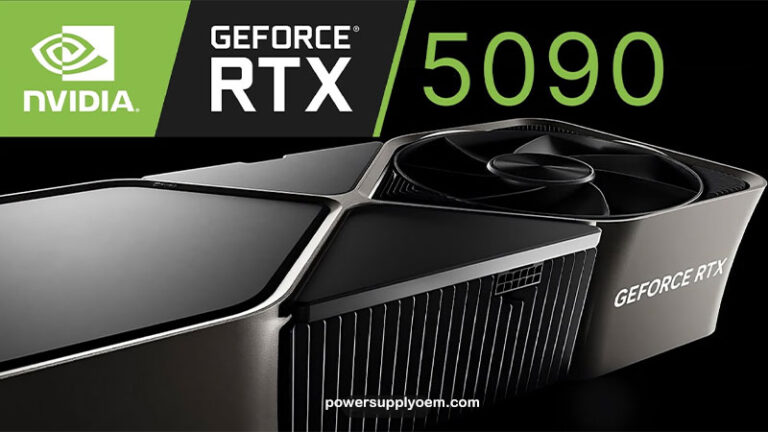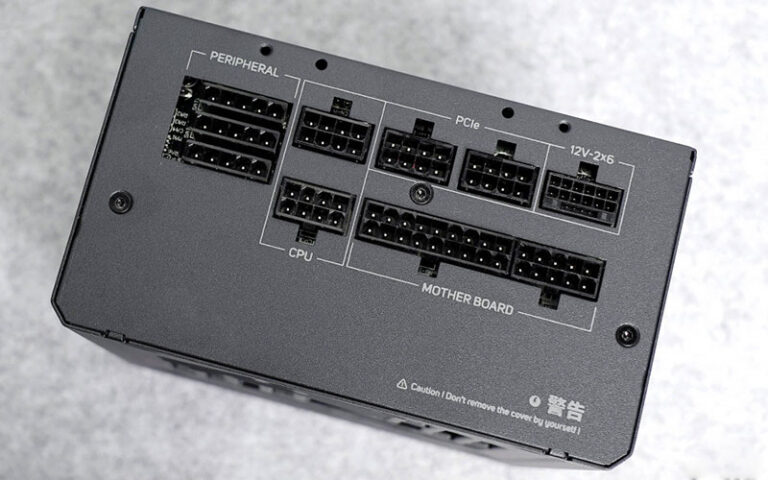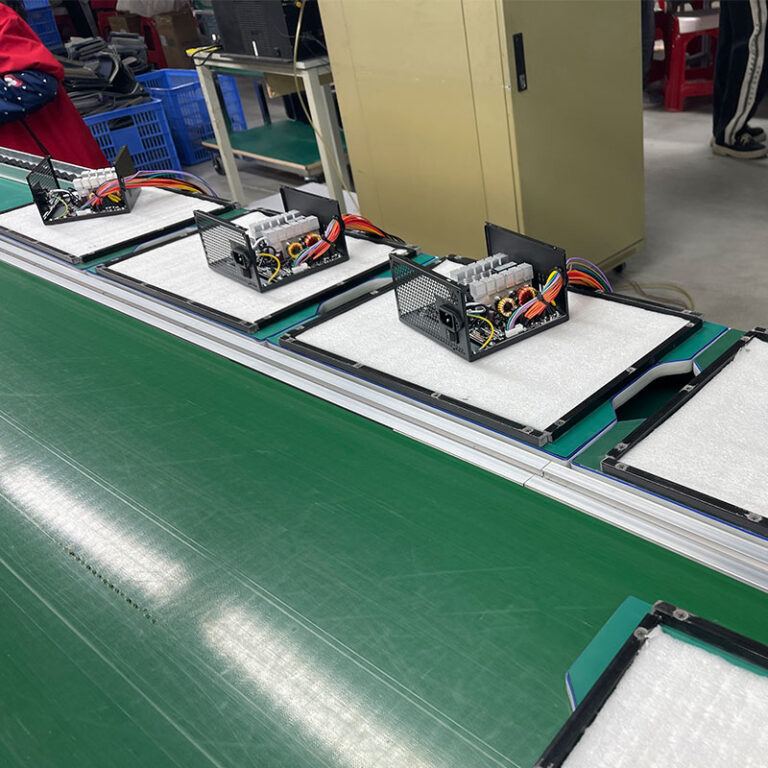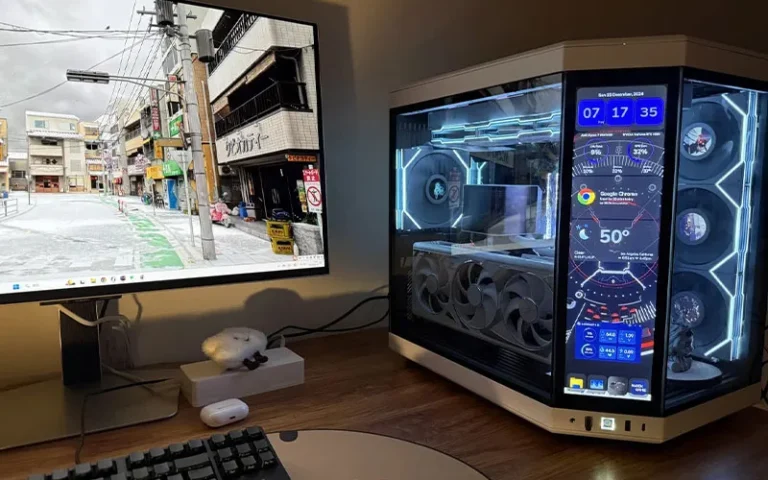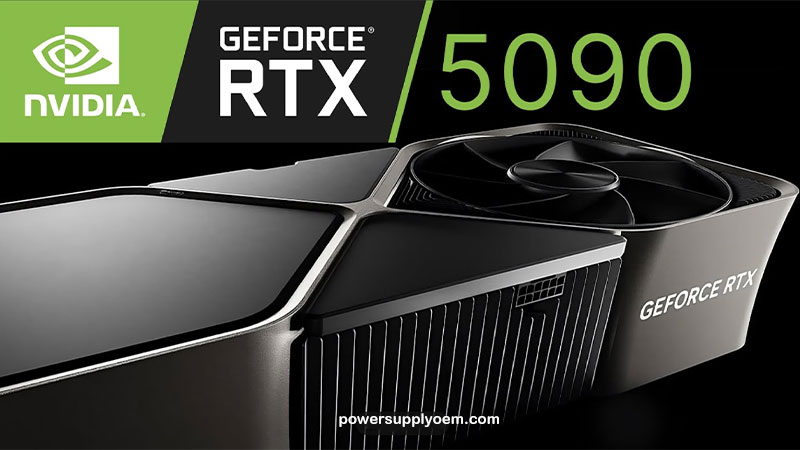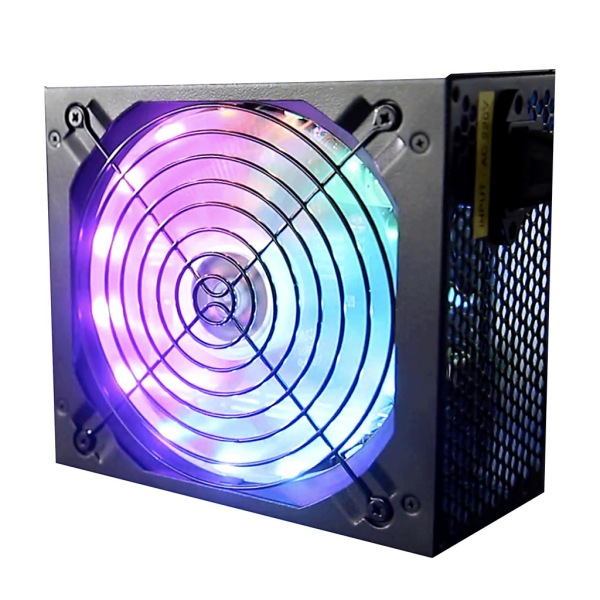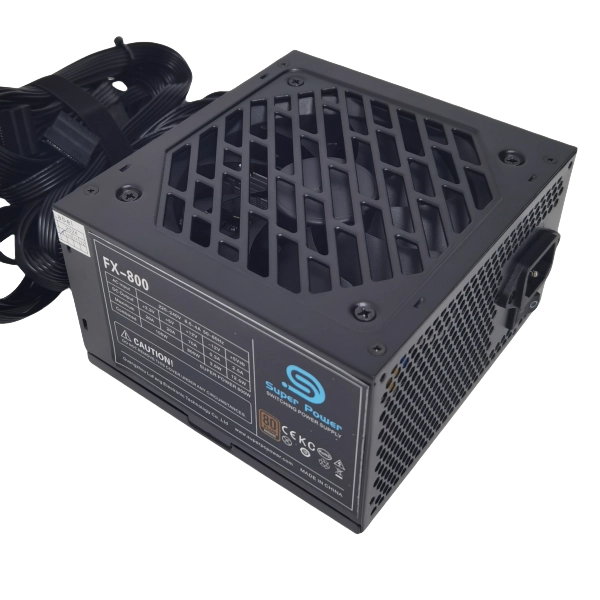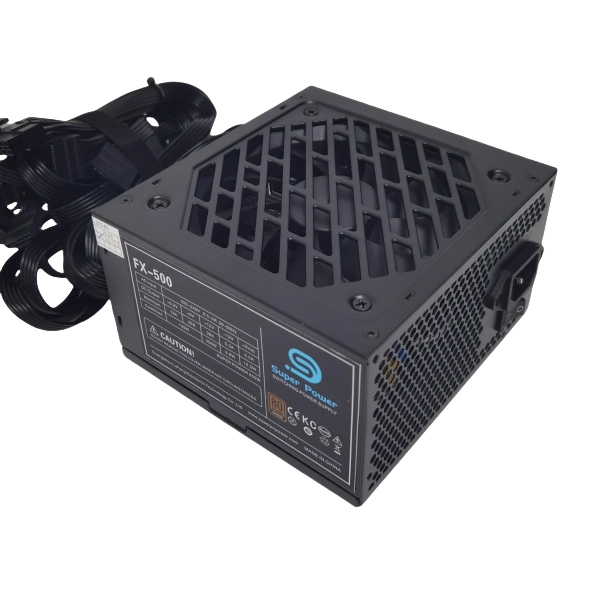-
Building E, No. 65 Xingshan North Road, Liangtian, Baisha Industrial Park, Baiyun District, Guangzhou
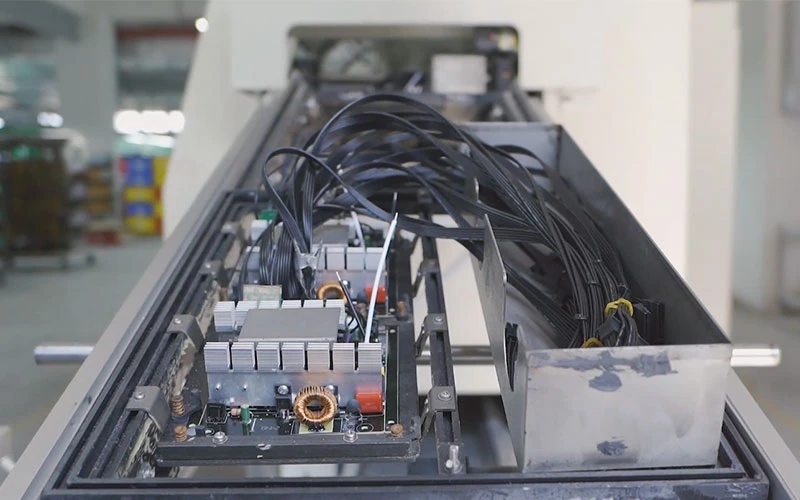
Understanding PSU Efficiency: Bronze vs Gold Ratings Explained
Bronze vs. Gold vs. Platinum PSU: Understanding Power Supply Efficiency Ratings
When building or upgrading a PC, you’ll encounter power supply units (PSUs) with various 80 PLUS certifications: Bronze, Silver, Gold, Platinum, and Titanium. But what do these ratings actually mean, and how do you choose between Bronze vs. Gold or Gold vs. Platinum? This comprehensive guide decodes power supply ratings, explaining the 80 PLUS certification program, the differences between 80 PLUS levels, and how PSU efficiency impacts your system, your electricity bill, and the environment.
Table of Contents
1. What is the 80 PLUS Certification Program?
The 80 PLUS certification program is a voluntary certification program launched in 2004 to promote energy efficiency in computer power supplies. It’s become a widely recognized industry standard, helping consumers identify efficient power supplies. 80 PLUS certification is very important.
Here’s how it works:
- Voluntary Certification: Power supply manufacturers submit their PSUs to an independent testing lab. It is a voluntary certification where manufacturers send their power supplies to an independent body for testing.
- Testing: The lab tests the PSU’s efficiency at different load levels: 20%, 50%, and 100% of its rated capacity. Efficiency at 20%, 50%, and 100% load is measured.
- Certification: If the PSU meets or exceeds the specified efficiency thresholds for a particular level (e.g., 80 PLUS Bronze, 80 PLUS Gold), it receives the corresponding certification.
- PSUs under the 80 PLUS program are tested.
The 80 PLUS certification program provides a clear and objective way to compare the efficiency of different power supplies.
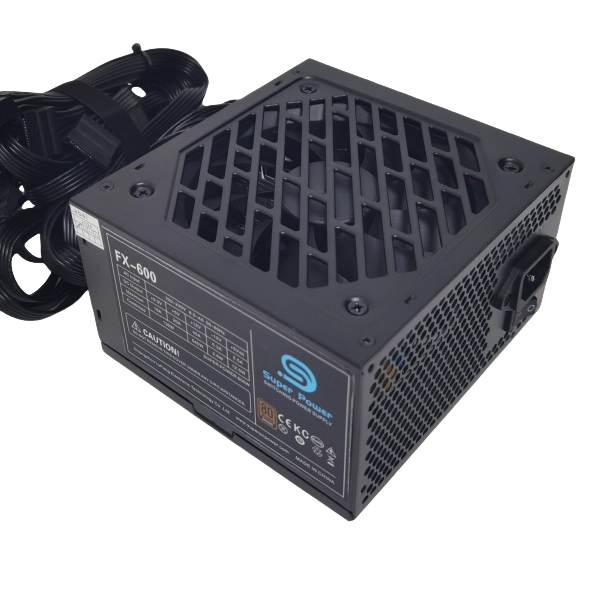
2. Understanding Power Supply Efficiency: AC vs. DC Power
To understand 80 PLUS certification, you need to grasp the basics of power supply efficiency:
- AC Power: The type of power that comes from your wall outlet.
- DC Power: The type of power that your computer’s internal components use.
A PSU converts the AC power from the wall into DC power for your components. However, this conversion process isn’t perfectly efficient; some energy is inevitably lost as heat.
Power Supply Efficiency = (DC Output Power / AC Input Power) x 100%
For example, if a PSU draws 500W of AC power from the wall and delivers 400W of DC power to the components, its efficiency is (400W / 500W) x 100% = 80%. The PSU converts the AC power.
3. The 80 PLUS Certification Levels: A Detailed Breakdown
The 80 PLUS program defines several certification levels, each with progressively stricter efficiency requirements. Here’s a table summarizing the different levels. This table shows the requirements for 115V Internal Non-Redundant:
| Certification Level | 20% Load | 50% Load | 100% Load | Power Factor |
| 80 PLUS (White) | 80% | 80% | 80% | 0.9 |
| 80 PLUS Bronze | 82% | 85% | 82% | 0.9 |
| 80 PLUS Silver | 85% | 88% | 85% | 0.9 |
| 80 PLUS Gold | 87% | 90% | 87% | 0.9 |
| 80 PLUS Platinum | 90% | 92% | 89% | 0.95 |
| 80 PLUS Titanium | 90% | 94% | 90% | 0.95 |
| 80 PLUS Titanium | 94% at 10% load |
Key Takeaways:
- Higher is Better: A higher certification level (e.g., 80 PLUS Platinum vs. 80 PLUS Gold) indicates a more efficient PSU.
- Power Factor: The program also specifies minimum power factor requirements. Power factor is a measure of how effectively the PSU utilizes the incoming AC power. A power factor closer to 1 is ideal.
- 115V Internal Non-Redundant vs. 230V EU Internal Non-Redundant: There are slightly different efficiency targets for different input voltages and for redundant power supplies (used in servers and critical systems). The table above shows requirements for the common 115V internal non-redundant.
- Titanium Level: The Titanium level is tested at a 10% load.
The basic 80 PLUS level is sometimes referred to as “80 PLUS White.” 80 PLUS certification levels range from basic to Titanium. There is a significant difference between bronze and gold, and gold and platinum.
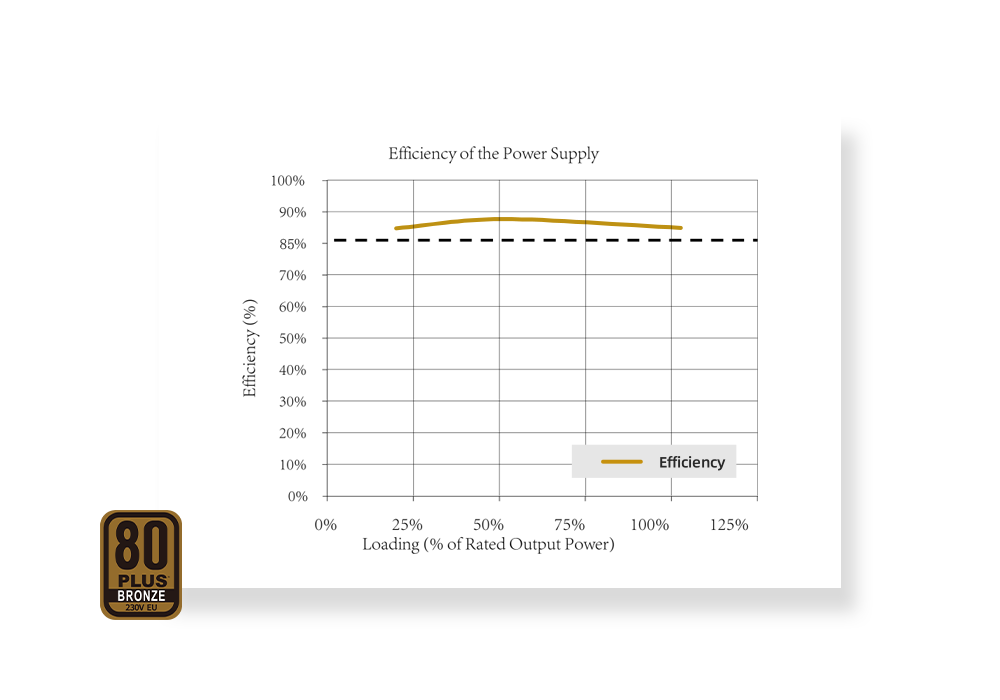
4. Why Does PSU Efficiency Matter?
PSU efficiency impacts several aspects of your computer system and your overall experience:
- Electricity Bill: A more efficient PSU wastes less energy as heat, which translates to a lower electricity bill. While the savings might seem small for an individual user, they can accumulate over time, especially for businesses or users with multiple computers, or high power systems.
- Heat Generation: Less energy wasted as heat means the PSU runs cooler. This has several benefits:
- Improved System Stability: Lower temperatures can improve the stability and reliability of your entire system, especially in high-performance or compact PCs with limited airflow.
- Reduced Fan Noise: A cooler PSU often means the fan doesn’t need to spin as fast, resulting in quieter operation. Less heat means less noise.
- Potentially Longer Component Lifespan: Reduced thermal stress can extend the lifespan of the PSU and other components.
- Environmental Impact: Higher efficiency means lower energy consumption, which reduces your carbon footprint and contributes to a more sustainable environment.
In summary, choosing an efficient PSU benefits your wallet, your computer’s performance and longevity, and the environment.
5. Beyond 80 PLUS: Other PSU Features to Consider
While the 80 PLUS rating is important, it’s not the only factor to consider when choosing a PSU. Other crucial features include:
- Wattage: Choose a PSU with sufficient wattage to power your components, plus some headroom for future upgrades.
- Form Factor: Ensure the PSU’s form factor (ATX, SFX, TFX, etc.) is compatible with your computer case. Check out our ATX Power Supply, SFX Power Supply, FLEX Power Supply, and TFX Power Supply options.
- Connectors: Verify that the PSU has all the necessary connectors for your motherboard, CPU, graphics card, storage devices, and other peripherals.
- Modularity: Modular or semi-modular PSUs allow you to detach unnecessary cables, improving airflow and cable management.
- Protection Features: Look for PSUs with over-voltage, under-voltage, over-current, short-circuit, and over-temperature protection.
- Fan Size and Noise: A larger fan can often cool the PSU more effectively and quietly.
- Warranty: A longer warranty (e.g., 5, 7, or 10 years) indicates the manufacturer’s confidence in the PSU’s reliability.
By considering all these factors, you can select a PSU that not only meets your power needs but also provides optimal performance, reliability, and longevity.
6. Choosing the Right 80 PLUS Rating for Your Needs
Here’s a general guide to selecting the appropriate 80 PLUS rating for different use cases:
- Basic Office/Web Browsing PC: 80 PLUS (White) or 80 PLUS Bronze is usually sufficient.
- Mid-Range Gaming/General Use PC: 80 PLUS Gold is a good choice, balancing efficiency, cost, and performance.
- High-End Gaming/Content Creation PC: 80 PLUS Gold or 80 PLUS Platinum is recommended for optimal efficiency and to handle the power draw of high-end components.
- Workstations/Servers: 80 PLUS Platinum or 80 PLUS Titanium is often preferred for maximum efficiency and reliability in demanding 24/7 operation.
Keep in mind that higher-rated PSUs generally cost more, but the long-term energy savings and potential for improved system stability can justify the investment, especially for high-end systems. Certified PSUs are a worthwhile investment.
7. Debunking Common Myths About 80 PLUS Ratings
There are some common misconceptions about 80 PLUS ratings:
- Myth: A higher 80 PLUS rating means the PSU delivers more power.
- Reality: The 80 PLUS rating only indicates efficiency, not the maximum wattage. A 500W 80 PLUS Bronze PSU and a 500W 80 PLUS Platinum PSU both deliver a maximum of 500W, but the Platinum unit will draw less power from the wall to do so.
- Myth: An 80 PLUS rating guarantees a high-quality PSU.
- Reality: While 80 PLUS certification is a good indicator of quality, it doesn’t guarantee it. Other factors, such as component quality, build quality, and warranty, are also important. Cheap power supplies may not actually meet the ratings.
- Myth: You always need the highest 80 PLUS rating possible.
- Reality: While higher efficiency is generally better, the optimal rating depends on your needs and budget. For most users, 80 PLUS Gold offers an excellent balance.
Understanding these distinctions helps you make informed decisions when choosing a PSU.
8. OEM Power Supplies and 80 PLUS Certification
As an OEM (PC power supply, ATX power supply, SFX power supply, FLEX power supply, TFX power supply, 80 PLUS Gold) manufacturer, we recognize the importance of energy efficiency and offer a wide range of 80 PLUS certified PSUs. We provide solutions for:
- PC power supply brands.
- 3C supermarkets.
- Computing equipment manufacturers.
- IoT device manufacturers.
- Power supply wholesalers.
- Agents.
- Large Internet cafes.
Here’s why partnering with us is advantageous:
- Customization: We can tailor power supplies to your specific needs, including wattage, form factor, connectors, cabling, branding, and efficiency targets.
- Quality Control: We implement rigorous testing procedures to ensure that our power supplies meet or exceed the specified 80 PLUS certification levels.
- Cost-Effectiveness: As a direct manufacturer, we can offer competitive pricing, especially for bulk orders.
By working with us, you can ensure that your products are equipped with high-quality, efficient power supplies that meet industry standards and customer expectations.
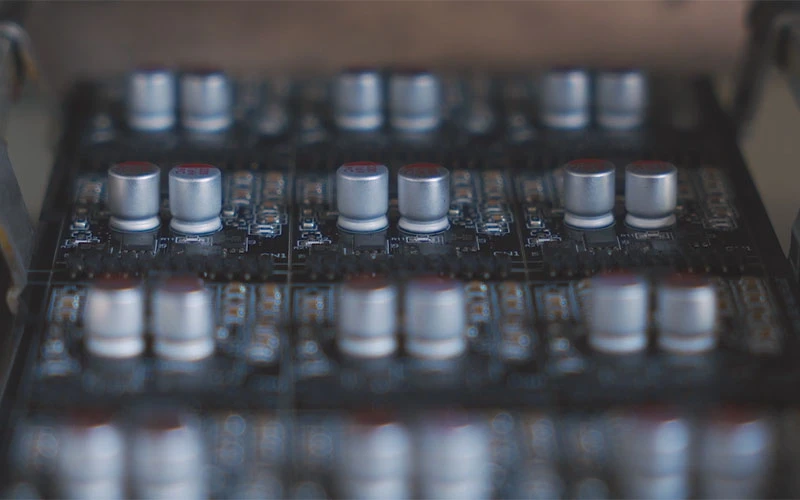
9. The Future of PSU Efficiency Standards
The 80 PLUS certification program has significantly contributed to improving power supply efficiency over the years. As technology advances, we can expect even more efficient PSUs in the future.
Some trends to watch include:
- Higher Efficiency Levels: New certification tiers beyond 80 PLUS Titanium might emerge, pushing efficiency even further.
- GaN (Gallium Nitride) Technology: GaN transistors are becoming increasingly popular in power supplies due to their higher efficiency and smaller size compared to traditional silicon transistors.
- Digital Power Supplies: Digital PSUs offer more precise control and monitoring of power delivery, potentially leading to improved efficiency and performance.
- Focus on Low-Load Efficiency: As computers become more energy-efficient in idle or low-power states, there will likely be a greater emphasis on improving PSU efficiency at very low loads (e.g., below 20% of rated capacity).
- ATX 3.0 and PCIe 5.0 Standards: These new standards introduce stricter power requirements and features.
These advancements will continue to drive down energy consumption and improve the overall performance and reliability of computer power supplies.
10. Case Studies: Real-World Impacts of PSU Efficiency
Let’s look at some examples of how PSU efficiency can make a real-world difference:
- Case Study 1 (Gaming PC): A gamer upgrades their PSU from an unrated 500W unit to a 650W 80 PLUS Gold certified unit. They notice a slight decrease in their electricity bill and find that their system runs cooler and quieter, especially during intense gaming sessions.
- Case Study 2 (Office PCs): A company replaces the power supplies in its office computers with 80 PLUS Bronze certified units. Over the course of a year, they see a noticeable reduction in their overall electricity consumption, leading to cost savings.
- Case Study 3 (Data Center): A data center upgrades its server power supplies to 80 PLUS Platinum certified units. The increased efficiency leads to significant energy savings, reduced cooling costs, and a smaller carbon footprint.
These case studies demonstrate that PSU efficiency can have a tangible impact on energy consumption, operating costs, and system performance.
Frequently Asked Questions
What does “80 PLUS” mean on a power supply?
It means the power supply is certified to be at least 80% efficient at 20%, 50%, and 100% load. This means that the PSU wastes less power as heat.
Is 80 PLUS Bronze good enough?
80 PLUS Bronze is acceptable for basic and mid-range systems, but 80 PLUS Gold is generally recommended for better efficiency and performance, especially for gaming PCs and workstations.
What’s the difference between 80 PLUS Gold and Platinum?
80 PLUS Platinum PSUs are more efficient than 80 PLUS Gold PSUs, particularly at higher loads. This results in slightly lower electricity bills and reduced heat output.
Do I need an 80 PLUS Titanium PSU?
Titanium PSUs offer the highest efficiency levels.
Titanium PSUs offer the highest efficiency, but they are also the most expensive. They’re typically only necessary for extreme high-end systems, servers, or users who prioritize maximum efficiency.
Can a higher 80 PLUS rating improve my PC’s performance?
While a more efficient PSU won’t directly increase your PC’s frame rates or processing speed, it can contribute to overall system stability, especially under heavy load, and potentially allow for better overclocking headroom. The PSU provides consistent and stable power.
Is it worth paying more for a higher 80 PLUS rating?
It depends on your usage. For high-end systems that are frequently under heavy load, the energy savings and potential for improved stability can justify the extra cost. For basic systems, the difference might be less noticeable.
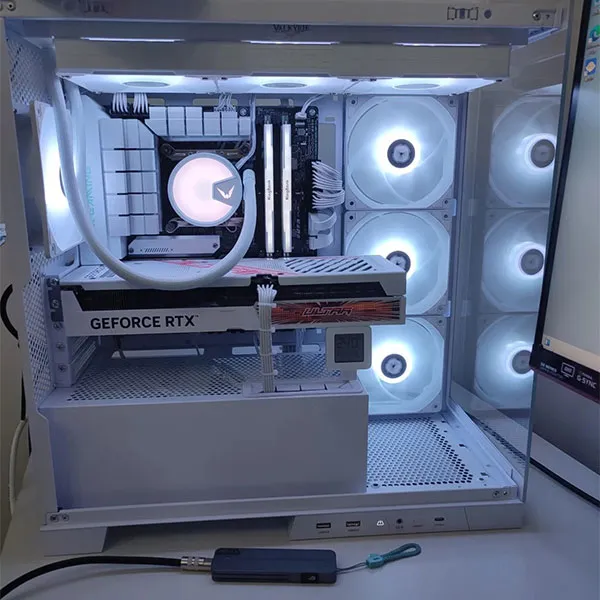
Summary
- The 80 PLUS certification program is a valuable tool for identifying energy-efficient power supplies (PSUs).
- 80 PLUS certification guarantees a minimum efficiency level at different load levels.
- Higher 80 PLUS ratings (80 PLUS Gold, Platinum, Titanium) indicate greater efficiency, which translates to lower electricity bills, less heat, and often higher-quality components.
- PSU efficiency affects your electricity bill, system cooling, and potentially system stability.
- Beyond 80 PLUS, consider other PSU features like wattage, form factor, connectors, modularity, and warranty.
- As an OEM power supply manufacturer, we offer a range of 80 PLUS certified PSUs and customized solutions.
- Partnering with us provides access to expertise, quality, cost-effectiveness, and customization options.
- We offer power supplies, including ATX, SFX, FLEX, and custom designs, to meet diverse needs.
- Understanding power supply ratings is crucial for making informed decisions when building or upgrading a PC.
- Our PC POWER SUPPLY options are highly rated.

